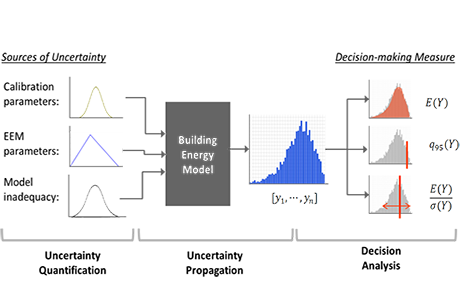
Energy Systems and Infrastructure Analysis
Uncertainty Analysis and Bayesian Calibration
Identifying and quantifying the uncertainties in building energy models, developing Bayesian Calibration methods for reducing the uncertainty and improving building energy models

Argonne researchers are working to understand the uncertainties involved in building energy modeling and the energy saving predictions and costs that are typically used when making decisions about a building during design, construction, and operation, or when considering a retrofit.
This work is identifying and quantifying the uncertainty in different parameters in energy models as well as in the energy models themselves. Argonne is developing tools to then propagate the uncertainty through the model to develop probabilistic energy use predictions instead of single deterministic numbers. The probabilistic predictions can then be analyzed to determine the risk of different design scenarios or underperformance of a retrofit under consideration.
To reduce the uncertainty of modeling existing buildings, Argonne is developing advanced tools for calibrating the prediction of energy models to measured utility use. The Argonne methods utilize start with the assumption that certain model parameters are uncertain, and utilize Bayesian statistics to reduce that uncertainty so that the predicted output has the highest probability of matching the measured energy use. The method will allow for nearly automatic calibration of building energy models.
The methods and software tools are being incorporated into the Open Source OpenStudio building energy modeling platform being developed by researchers at the National Renewable Energy Laboratory, Argonne, Lawrence Berkeley National Laboratory and Oak Ridge National Laboratory.